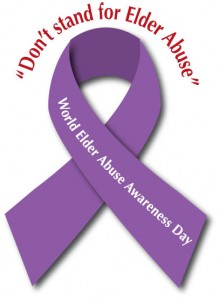BALTIMORE: (June 2, 20110) – Each year in Maryland, officials receive over 8,000 reports of elder abuse. The actual number of abuse victims may be much higher. It is estimated that only 1 in 14 cases of elder and vulnerable adult abuse is reported because of fear and isolation. As elders become frail, they are less able to defend themselves both physically and mentally. They may not see or hear as well or think as clearly as they used to, leaving openings for unscrupulous people to take advantage of them. Mental or physical ailments may make them more trying companions for the people who live with them
 June 15, 2011 is World Elder Abuse Awareness Day, a time to raise awareness and educate the public about this growing problem. Raising awareness is a fundamental prevention strategy that not only teaches new information but also helps to change attitudes and behavior.
June 15, 2011 is World Elder Abuse Awareness Day, a time to raise awareness and educate the public about this growing problem. Raising awareness is a fundamental prevention strategy that not only teaches new information but also helps to change attitudes and behavior.
Abuse of elders takes many different forms, some involving intimidation or threats against the elderly, some involving neglect, and others involving financial trickery. The most common types of abuse are physical, emotional, sexual, neglect or abandonment by caregivers, financial exploitation, and health care fraud. Warning signs of some kind of elder abuse may include frequent arguments or tension between the caregiver and the elderly person and changes in personality or behavior in the elder.
Baltimore County Restoring Elder Safety Today (REST) is sponsoring a rally again this year in Towson on Bosley Avenue. This yearly event brings attention to elder abuse in the community. Participating will be agency representatives from the departments of aging, fire, health, library, police, social services and the states attorneys office as well as community businesses and aging service providers.
Under the law any health practitioner, police officer, or human service worker who has reason to believe that a vulnerable adult is in danger is required to report that fact to the local department of social services. A toll free abuse hotline 1-800-91prevent (1-800-917-7383) is available. Any concerned person should also make such a report.
Be a good neighbor and check on the elderly in your community.
ELDER/VULNERABLE ADULT ABUSE PREVENTION
PUBLIC AWARENESS FACT SHEET
-
Each year in the United States, 1 to 2 million reports of elderly and vulnerable adult abuse are made; however, the real number of victims is even higher because most cases are not reported.
- It is estimated that only 1 in 14 cases of elderly and vulnerable adult abuse is reported.
- The Maryland Attorney General’s Office, Medicaid Fraud Control Unit, investigates and prosecutes incidents of abuse and neglect of vulnerable persons residing in facilities which receive Medicaid funds and in Assisted Living Facilities. Every year, the Medicaid Fraud Control Unit receives between 400 and 500 referrals regarding abuse and neglect of vulnerable persons. Each referral is reviewed and either investigated for criminal prosecution or referred to the appropriate regulatory agency. The Medicaid Fraud Control Unit also provides education and outreach to providers on how to prevent abuse and neglect as well as what to do if abuse or neglect occurs at a facility. For more information on protecting seniors from abuse and neglect, contact the Medicaid Fraud Control Unit at 410-576-6521 or at MedicaidFraud@oag.state.md.us.
- The Maryland Department of Aging, Long Term Care Ombudsman Program, receives, investigates, and resolves complaints made by or on behalf of long-term care residents. Of the 2,797 complaints investigated by the Ombudsman Program in 2010, 192 of the investigated reports were alleged resident abuse cases. For more information about programs and services for seniors, call the Maryland Department of Aging at 410-767-1100, toll-free 1-800-243-3425, or on the web at www.aging.maryland.gov.
- The Maryland Department of Health and Mental Hygiene, Office of Health Care Quality, receives allegations of abuse regarding residents/patients in all licensed and/or federally certified facilities. In 2010, the Office of Health Care Quality received approximately 946 reports of alleged vulnerable adult abuse. For more information about Office of Health Care Quality programs please call 410-402-8110, toll-free 1-877-402-8218, or on the web at www.dhmh.maryland.gov/ohcq.
- The Maryland Department of Human Resources, Office of Adult Services, Adult Protective Services Program, investigates allegations of adult abuse, neglect, self-neglect, or exploitation of an elderly or disabled vulnerable adult in a community-based setting. In FY 2010, the Adult Protective Services Program received approximately 6,005 reports of abuse, neglect, self-neglect and exploitation of vulnerable adults aged 18 years of age and older. Of these cases, 2,276 involved continuing Adult Protective Services case management services to monitor on-going risk factors. For more information about adult abuse, neglect or exploitation contact the Maryland Department of Human Resources at 410-767-7000, toll-free 1-800-917-7383, or on the web at www.dhr.maryland.gov.
- The Maryland Department of Human Resources, Office of Grants Management, provides community-based services to victims of domestic violence. In 2010, the Office of Grants Management served 414 victims of domestic violence who were 60 years of age or older. For more information about services available to victims of domestic violence contact the Maryland Department of Human Resources at 410-767-7000, toll-free 1-800-917-7383, or on the web at www.dhr.maryland.gov.
- The Maryland Network Against Domestic Violence (MNADV) is a coalition of domestic violence programs, law enforcement agencies, and concerned citizens. The MNADV reported that in 2010, 8 (21%) of the 38 persons killed in domestic violence incidents were 51 years of age or older. For more information on the coalition’s mission and services contact MNADV at 301- 352-4574, toll free 1-800-MD-HELPS, or on the web at http://mnadv.org.